Make your own buttery and flaky rum raisin coconut scones at home. They have a golden brown crust, tender crumbs, and just the right amount of sweetness. These small batch scones are perfect with morning coffee.
I have never been a huge fan of scones. That’s because I have had some dry, tasteless ones. I became a scone convert when I started making my own. Believe it or not, the best scone I have ever had was THE FIRST one I ever made. It was truly the best scone I had ever put in my mouth! The moon and stars must have aligned just right the day I created my masterpiece because I have not been able to exactly duplicate that scone since.
How was it the best? The crust was perfectly golden and flaky, while the inside was lightly sweet and buttery with crumbs that just melted in my mouth. My son and I could not get enough! Unfortunately, I made a tiny test batch, which to our disappointment, was scoffed up much too quickly.
These scones are not an exact replication of my masterpiece, but they are pretty darn good!!! The rum-soaked raisins provide sweetness and a little zing. When you have rum and raisins, you need coconut, too, right? Adding it was a no-brainer. They are a perfect threesome!
I like small batch baking. During summer, I like to whip up these small batch muffins. Since scones are best eaten the day of, they are ideal for small batch baking, too. The recipe yields four scones, easy enough to polish off in one day. But should they require storing, keep them in an airtight container at room temperature for three days or refrigerate for five.
To reheat, pop them in a preheated 300° F oven for 5 or so minutes or microwave for 15 seconds.
Scones are not complicated to make and require just minutes to mix by hand. However, there are a couple of rules to keep in mind to prevent them from becoming dense, dry, and tasteless. If you are experienced with making scones, you would probably agree with what I call “scone sins” to abstain from.
What to avoid when making scones:
- Avoid over-mixing and over-working the dough. Doing so develops gluten, resulting in dense and tough scones. For example, when making biscuits, work the dough just until it comes together. Then knead it a couple of times before shaping and cutting it into wedges.
- Avoid overbaking, which will result in dry, sticky scones that stick to the roof of your mouth. Remove the scones and check for doneness sooner rather than later. These scones bake between 16 and 20 minutes. They’re better checked at the 16-minute mark as opposed to the 20-minute mark. I always favor the side of underdone versus overdone.
Recipe highlights:
- Presoak the raisins in rum ahead of time. Drain and pat dry before use.
- Work the chunks of butter into the flour mixture using a pastry cutter or two knives.
- Add raisins and coconut flakes.
- Add cream, egg, and vanilla mixture using a fork to mix.
- When the dough holds together with the squeeze of your hand, dump it onto a floured work surface.
- Knead a couple of times.
- Shape into one 7-inch x 4-inch parallelogram-ish shape (as seen in the below).
- Cut into 4 wedges and place on a parchment lined or prepared baking sheet.
- Brush with heavy cream.
- Bake at 400° F for 16-20 minutes.
- Serve warm or at room temperature.
- See the recipe card below for detailed instructions.


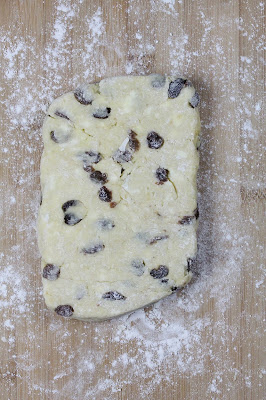
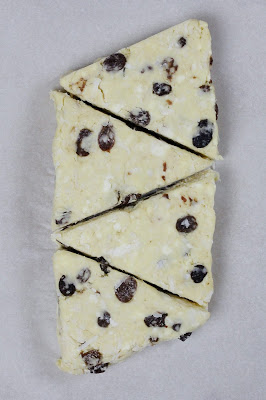
How to make rum raisins?
Place the raisins in a small bowl. Add enough rum to cover completely. Let stand for overnight or longer for a more intense flavor.
Do I need to soak the raisins?
Start with tender, plump raisins for your scones. I recommend soaking them, as some raisins tend to dry out sitting in the packages. If you prefer not to use rum, quickly reconstitute the raisins in juice or water. Soak raisins in hot apple juice, white grape juice, orange juice, or water for 15 minutes. Drain and thoroughly pat dry. The raisins are ready to use.
What is the role of egg yolk?
This recipe uses just 1 egg yolk. It adds moisture, leavening, rich flavor, and velvety texture to the scones.
What does cornstarch do for scones?
Cornstarch is added to the flour mixture in this recipe. It acts as a tenderizer. Liquid causes gluten development as the flour absorbs it. Cornstarch absorbs some of that liquid, leaving less liquid for the flour. This, in turn, reduces some of the gluten development. It all translates to more tender scones!
Why keep everything cold?
Keeping the butter cold is the key to flaky scones. Butter creates steam pockets as it melts in the oven, creating lift and layers. To keep the butter cold, keep the remaining ingredients cold until you are ready to use them. Freeze for 20-30 minutes to firm up the butter prior to baking. Freezing also allows the dough to rest and relax the gluten.
If you are not a raisin lover, don’t let that stop you from trying this out. Swap out the raisins for something you do like. How about dried cranberries? Take the fresh route and add fresh blueberries or raspberries. It is such a treat to make scones that you won’t find at your local shops.
Thanks for stopping by! I appreciate every one of you and your support for this blog! ♡
Recommended supplies:
(Affiliate links. The products I recommend are either what I use, are on my wish list, or come highly rated.)
- A pastry mat is unnecessary, but it helps prevent the dough from sticking to the work surface. This one is non-slip silicone.
- Use your hands or a pastry cutter to work the cold butter into the flour.
- A bench cutter helps with scraping the dough off the work surface.
- This baking sheet has a corrugated surface, which promotes air circulation, quick release, and even baking.
You Might Also Like:
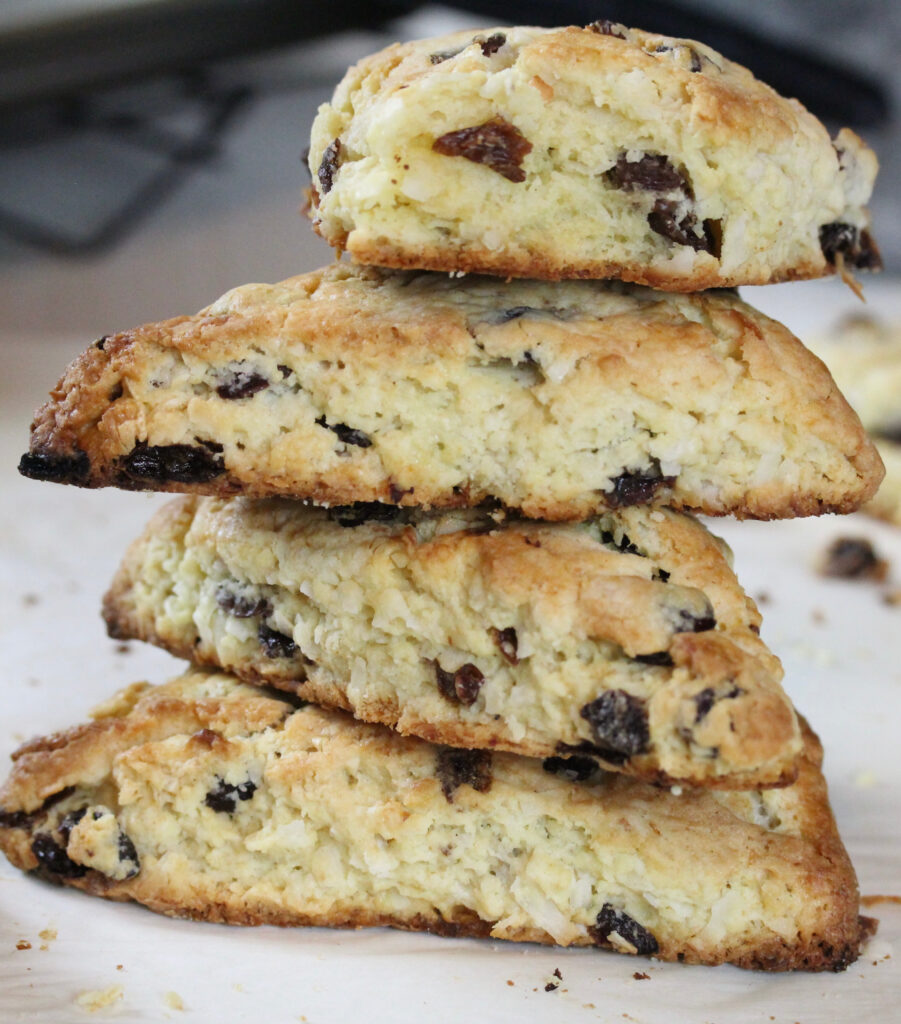
Small Batch Rum Raisin Coconut Scones
Description
Make your own buttery and flaky rum raisin coconut scones at home. They have a golden brown crust, tender crumbs, and just the right amount of sweetness. These small batch scones are perfect with morning coffee.
Ingredients
Instructions
- Prep time provided does not include the overnight to 24-hour soak time for rum raisins.
- Soak raisins in enough rum to completely cover raisins. Cover. Allow to sit overnight or one day ahead before making scones. Drain and thoroughly pat dry when ready to use.
- Preheat oven to 400° F.
- In a small bowl, whisk 1/3 cup heavy cream, egg yolk, and vanilla until smooth. Set aside.
- In a mixing bowl, combine flour, cornstarch, baking powder, salt, and sugar. Add butter. Work butter into pea-size shapes using a pastry cutter or two knives. If necessary, use the blunt end of a knife to scrape off clumps of butter on the pastry cutter.
- Blend in raisins and coconut.
- Gradually add in heavy cream mixture, reserving 1 tablespoon. Use a fork to blend. Switch over to a rubber spatula, work the mixture, and scrape the dry areas on the bottom of the bowl.
- The mixture will become moist clumps. Gently squeeze a tablespoon of the batter in your hand. If it holds together, it is ready. If it crumbles, add the remaining tablespoon of the reserved cream mixture and combine. Squeeze and test the mixture again. If it still crumbles, add a touch of cream. Be careful not to add too much.
- Pour the mixture into a lightly floured work surface. Gather and knead dough a couple of times. Shape into a 7-inch x 4-inch parallelogram-ish shape by slanting the sides. Flatten to 3/4-inch thickness. Use a sharp knife to cut out four wedges.
- Place the cookies two inches apart on a parchment-lined or prepared baking sheet. Brush the tops and sides lightly with cream.
- Bake on the middle rack for 16-20 minutes or until the tops are golden brown. Check for doneness by inserting a toothpick in the thickest part of the center. It’s perfect when the toothpick comes out with a few dry crumbs.
- Cool for 5 minutes. Serve warm or at room temperature.
- Makes 4 scones.
Notes
- Keep all ingredients cold until ready to use. Cold butter creates volume and layers.
- For a non-alcoholic version, omit rum. Soak raisins in hot apple juice, white grape juice, orange juice, or water for 15 minutes to reconstitute. Drain and pat dry. Raisins are ready to use.
- I prefer not to mix the batter with my hands to avoid warming up the butter.
- Store in a tight container at room temperature for 3 days and refrigerate for 5.
- Reheat at 300° F for 5 or so minutes or microwave for 15 seconds.
Disclosure: This site contains paid advertising and affiliate links. In Good Flavor is a participant in the Amazon Services LLC Associates Program, an affiliate advertising program designed to provide a means for sites to earn advertising fees by advertising and linking to Amazon.com.

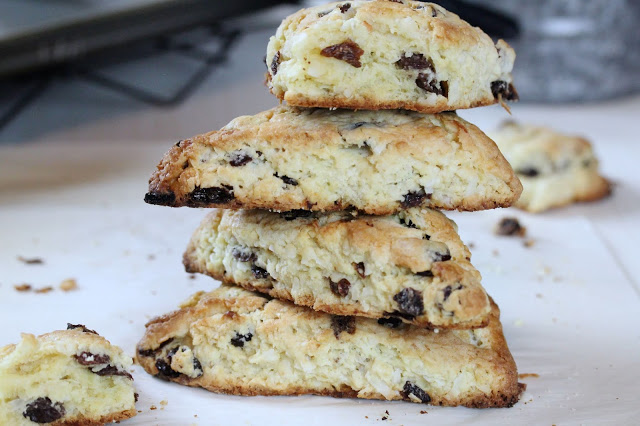


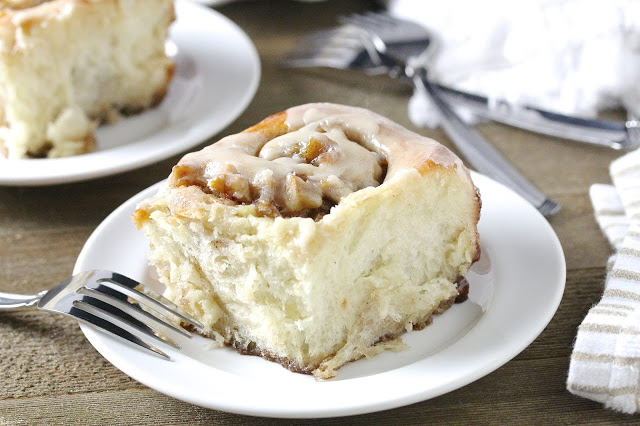 Apple Walnut Buns with Maple Brown Butter glaze
Apple Walnut Buns with Maple Brown Butter glaze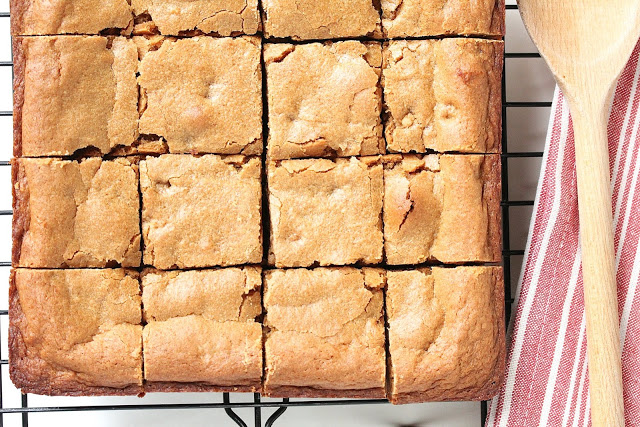 Caramel Apple Butter Blondies
Caramel Apple Butter Blondies
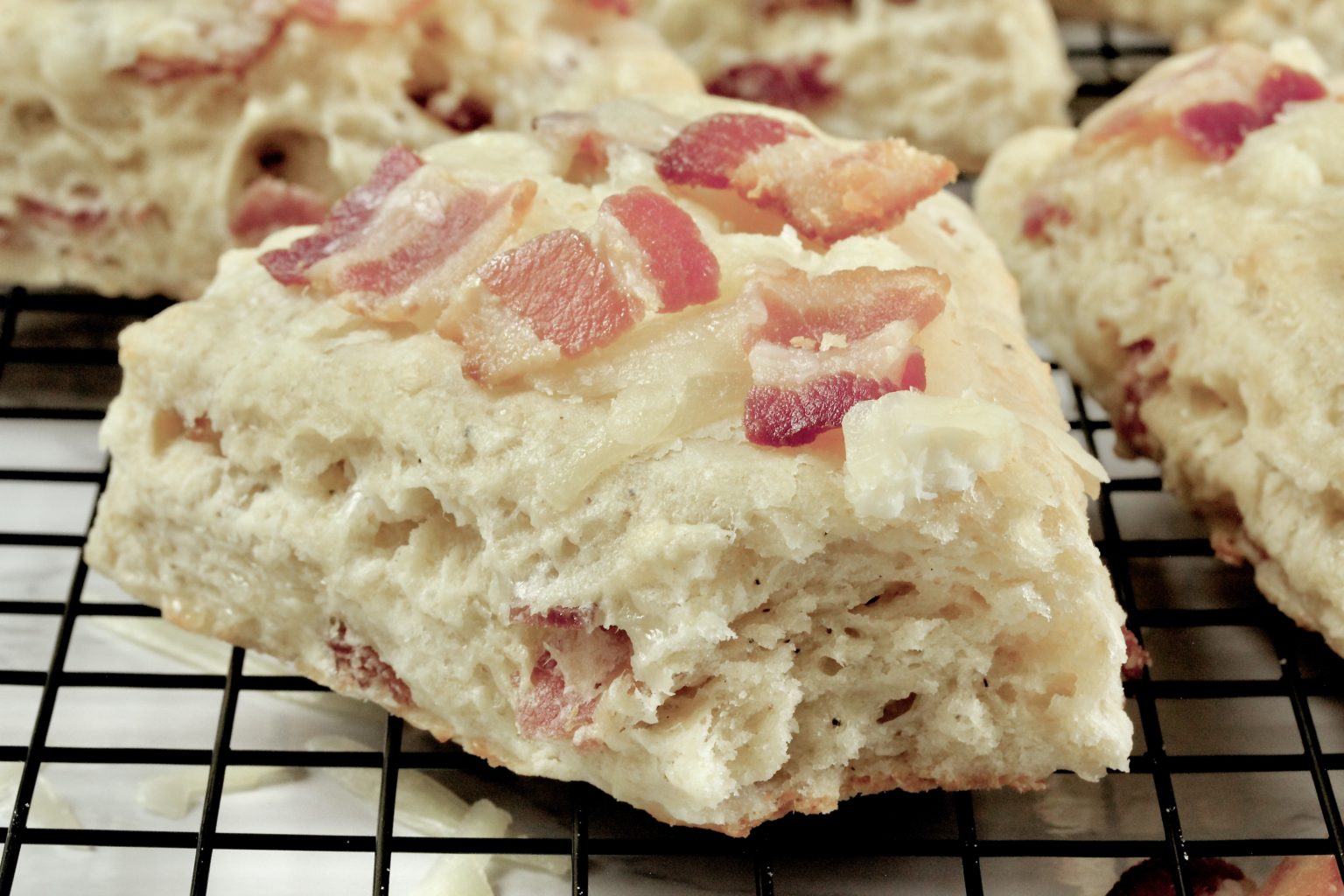 Horseradish Cheddar and Bacon Scones
Horseradish Cheddar and Bacon Scones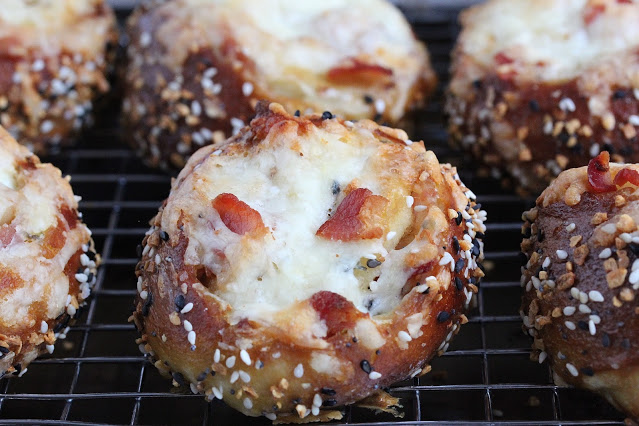 Bacon Cream Cheese Pretzel Buns
Bacon Cream Cheese Pretzel Buns


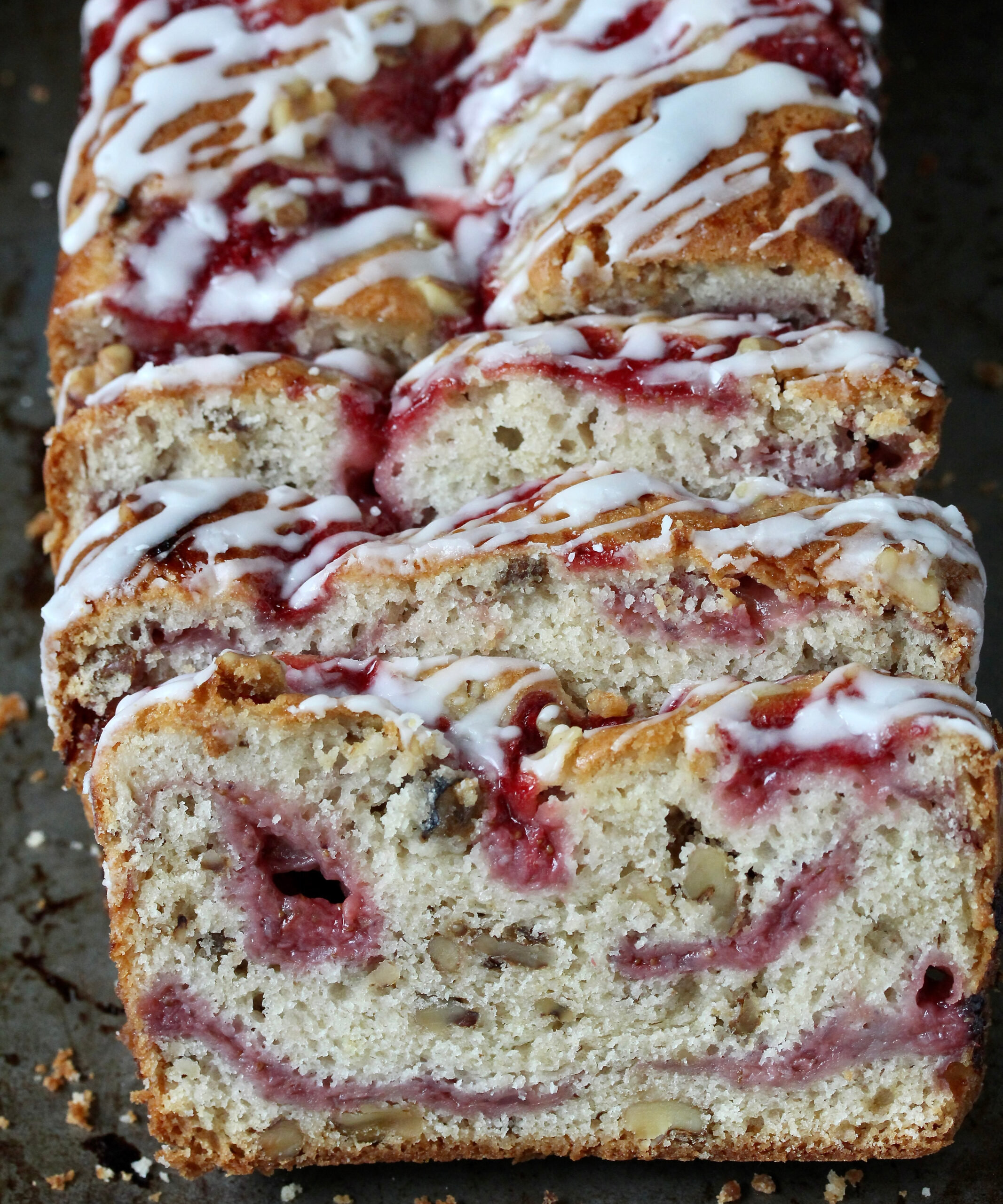
I love scones but was wary of them at first. My oldest started baking them at college and that got me started. Rum soaked raisins sound like a good addition!
There are good scones and not that great scones. I never cared to make my own either. But when I started making my own, I really enjoy the process. Have a great week, Inger!